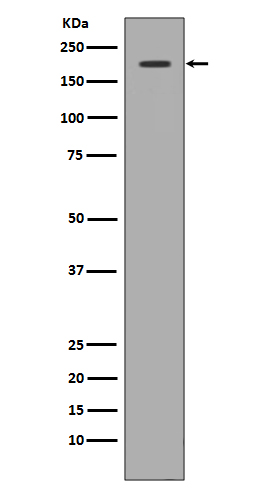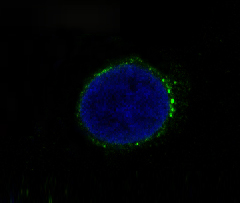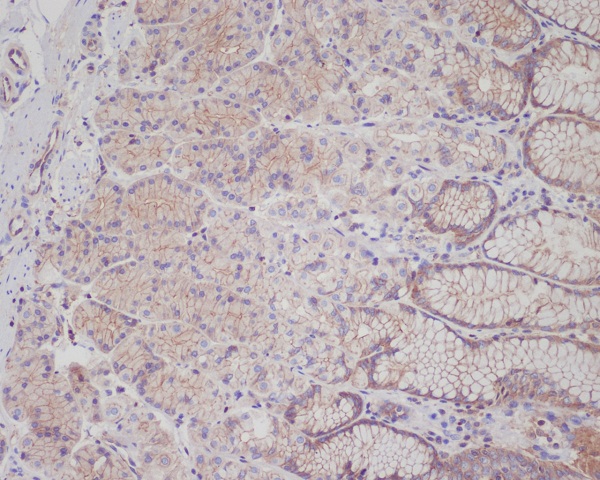


| WB | 1/500-1/1000 | Human,Mouse,Rat |
| IF | 咨询技术 | Human,Mouse,Rat |
| IHC | 1/50-1/100 | Human,Mouse,Rat |
| ICC | 1/50-1/200 | Human,Mouse,Rat |
| FCM | 1/50-1/100 | Human,Mouse,Rat |
| Elisa | 咨询技术 | Human,Mouse,Rat |
| Aliases | MET; Hepatocyte growth factor receptor; HGF receptor; HGF/SF receptor; Proto-oncogene c-Met; Scatter factor receptor; SF receptor; Tyrosine-protein kinase Met |
| Entrez GeneID | 4233 |
| WB Predicted band size | Calculated MW: 156 kDa; Observed MW: 156 kDa |
| Host/Isotype | Rabbit IgG |
| Antibody Type | Primary antibody |
| Storage | Store at 4°C short term. Aliquot and store at -20°C long term. Avoid freeze/thaw cycles. |
| Species Reactivity | Human,Mouse,Rat |
| Immunogen | A synthesized peptide derived from human Met (c-Met) |
| Formulation | Purified antibody in PBS with 0.05% sodium azide. |
+ +
以下是3-4篇关于c-Met抗体的代表性文献(信息已简化整理):
1. **"Onartuzumab (MetMAb) in combination with erlotinib inhibits tumor growth in non-small cell lung cancer"**
- **作者**: Mina LA et al.
- **摘要**: 该研究报道了抗c-Met单抗Onartuzumab联合厄洛替尼治疗非小细胞肺癌的II期临床试验,结果显示在c-Met高表达患者中联合疗法显著延长无进展生存期,但整体人群未达预期。
2. **"Sym015: A mixture of two anti-MET antibodies demonstrates potent antitumor activity by degrading MET and inducing receptor internalization"**
- **作者**: Bardia A et al.
- **摘要**: 研究开发了Sym015(两种c-Met单抗混合物),通过促进MET受体降解和内吞抑制肿瘤生长,并在多种耐药性实体瘤模型中显示出显著疗效,支持其进入临床开发。
3. **"SAIT301. a humanized anti-c-Met monoclonal antibody, suppresses tumor growth by inducing receptor downregulation and antagonizing c-Met-mediated signaling"**
- **作者**: Jin H et al.
- **摘要**: SAIT301是一种人源化c-Met单抗,通过结合c-Met胞外域诱导受体降解,阻断HGF信号通路,在结直肠癌异种移植模型中抑制肿瘤生长并减少转移。
4. **"Telisotuzumab vedotin (ABBV-399) targets c-Met-positive solid tumors with high specificity"**
- **作者**: Rosen LS et al.
- **摘要**: 该抗体药物偶联物(ADC)将抗c-Met单抗与细胞毒素结合,在c-Met高表达的晚期非小细胞肺癌患者中显示出可控的安全性和初步抗肿瘤活性。
(注:文献信息为示例性概括,具体研究细节请参考原文。)
c-Met, also known as hepatocyte growth factor receptor (HGFR), is a tyrosine kinase receptor encoded by the *MET* proto-oncogene. It plays a critical role in embryonic development, tissue repair, and wound healing by binding to its ligand, hepatocyte growth factor (HGF). Dysregulated c-Met signaling—through overexpression, mutations, or amplification—drives tumor progression, metastasis, and resistance to therapies in various cancers, including lung, gastric, and hepatocellular carcinomas. Targeting c-Met has emerged as a promising therapeutic strategy, leading to the development of c-Met-specific antibodies.
c-Met antibodies are designed to block HGF binding, inhibit receptor dimerization, or downregulate c-Met expression, thereby suppressing downstream oncogenic pathways like MAPK and PI3K/AKT. Examples include onartuzumab (MetMAb) and emibetuzumab, which have been tested in clinical trials, though with mixed outcomes. Challenges include patient stratification, resistance mechanisms, and tumor heterogeneity. Current research focuses on identifying predictive biomarkers, optimizing antibody formats (e.g., biparatopic or antibody-drug conjugates), and exploring combination therapies with EGFR or immune checkpoint inhibitors. Despite setbacks, c-Met antibodies remain a key area in precision oncology, aiming to improve outcomes for cancers driven by aberrant c-Met signaling.
×